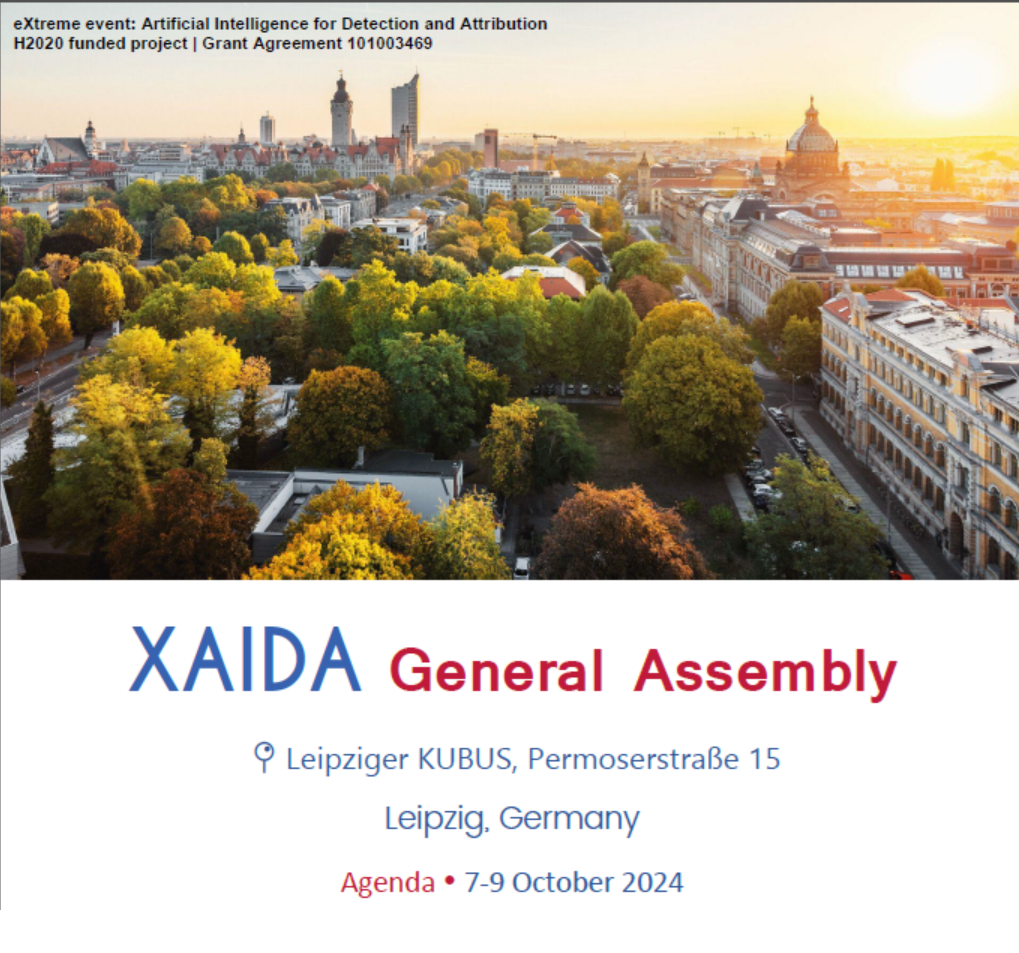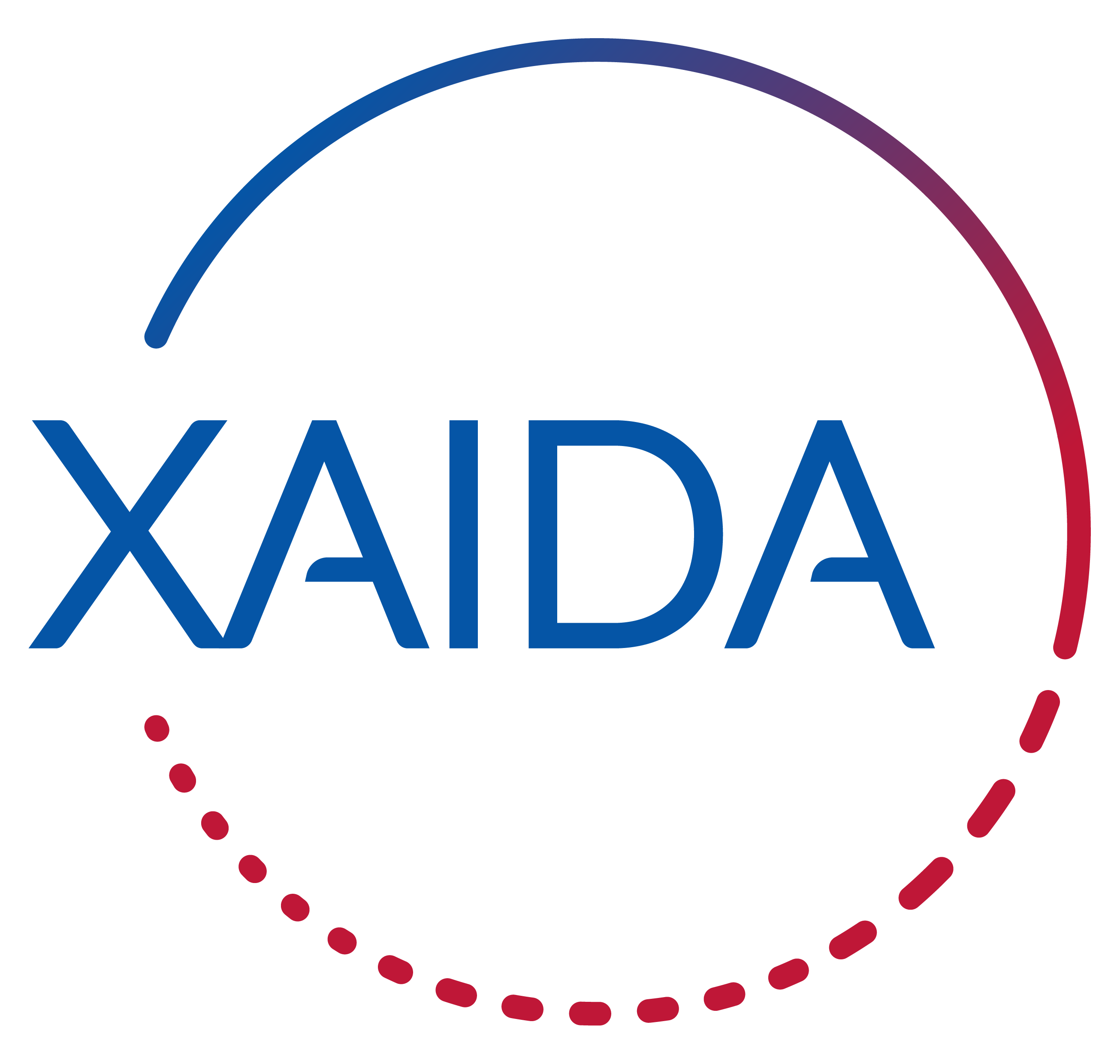XAIDA 3rd GENERAL ASSEMBLY
Dates: 7-9 October 2024
Location: Leipziger KUBUS, UFZ, Leipzig, Germany (Maps)
Format: hybrid
Contact: mrousselle@ipsl.fr

Organisation:
Dim COUMOU (VU), Manon ROUSSELLE (IPSL), Pascal YIOU (IPSL), Jakob ZSCHEISCHLER (UFZ)
With help and suggestions from:
Emmanuele BEVACQUA (UFZ), Marlene KRETSCHMER (U. Leipzig), Apolline SAUVIGNET (IPSL), Sebastian SIPPEL (U. Leipzig)
Overarching goal of the General Assembly
Reflect on current state of XAIDA-relevant science, identify important outstanding research questions and how classical and novel methods could contribute to those
Facilitate the discussion in 4 plenary ‘Science blocks’ of each 2 hours:
- 1 on AI and data-driven methods (leads: WP3-5): Focussed on developments in WP3 and WP4. Application oriented work from WP5 enters in Blocks 2-4
- 3 on specific type of extremes (leads respectively WP6-8)
GOALS of the Science Blocks:
- What is the latest research in and outside XAIDA?
- What are important research gaps?
- How can XAIDA and non-XAIDA methods contribute to addressing research gaps in last 1,5 yrs of XAIDA?
Space & time for informal discussions
We decided to not have break-out sessions, but rather opt for facilitating ample time for bilateral discussions and discussions in small groups. Enough time will be reserved during poster session and coffee breaks. To make it efficient we will prepare a matchmaking before the GA. Also we aim for more posters (poster session on first evening) and the posters will remain in venue throughout the GA.
DAY 1: Monday 7 October 2024
Morning
- 09:00 – 09:20 Welcome remarks – Jakob Zscheichler (UFZ)
- 09:20 – 09:55 XAIDA: Status, technical report & GA – Dim Coumou (VU)
- 09:55 – 10:00 Prepare matchmaking – Manon Rousselle (IPSL)
- 10:00 – 10:30 Science Block 1: Methods (1st hour): Chair Jakob Runge (TUD)
- DL for drought detection: Methodologies and challenges (20′) – Miguel-Ángel Fernández-Torres (U. Madrid)
- 10:30-11:00 Coffee Break
- 11:00 – 12:30 Science Block 1: Methods (2nd hour): Chair Jakob Runge (TUD)
- Challenges of spatiotemporal Earth surface forecasting under extreme climate conditions (20′) – Maria Gonzalez- Calabuig (UVEG)
- Anomalies and causality (20′) – Martin Rabel (TUD)
- Causal inference in frequency space and further topics (20′) – Jakob Runge (TUD)
- Discussion: How can new methods contribute to addressing research gaps in last 1,5 years of XAIDA? (30′) – Moderation: Jakob Runge (TUD)
- 12:30-14:00 Lunch Break
Afternoon
- 14:00 – 15:15 Science Block 2: Heatwaves, droughts & compound events (1st hour) | Chair: Jakob Zscheischler (UFZ)
- A hazard and impact storyline for an extreme Central European heatwave (15′) – Erich Fischer (ETH)
- Emergence of strong trends in humid heat intensity and duration in recent decades over South Asia (15′) – Jitendra Singh (UFZ)
- Drivers and impacts of compound weather extremes on crop production (15′) – Raed Hamed (VU)
- Observed circulation trends in boreal summer linked to two spatially distinct teleconnection patterns (15′) – Tamara Happé (VU)
- Moderate global warming does not rule out potentially high-impact global climates (15′) – Emmanuele Bevacqua (UFZ)
- 15:15 – 15:45 Coffee Break
- 15:45 – 16:30 Science Block 2: Heatwaves, droughts & compound events (2nd hour) | Chair : Jakob Zscheischler
- Broadening the scope of anthropogenic influence in extreme event attribution (15′) – Aglaé Jézéquel (LMD-IPSL)
- General Discussion: Research gaps (30′) – Moderator: Jakob Zscheischler (UFZ)
- 16:30-19:00 Posters Session & Match-making
DAY 2: Tuesday 8 October 2024
Morning
- 9:45 – 11:15 Science Block 3: Persistent winter extremes (1st hour) | Chair: Marlene Kretschmer (UL)
- Introduction and overview of WP7 (15′) – Marlene Kretschmer (UL)
- Subseasonal drivers: Influence on European weather regimes and energy during boreal winter (20′) – Emmanuel Rouges (UR)
- Evaluating the intensity and dynamics of European winter cold spells in CMIP6 (20′) – Camille Cadiou (LSCE-IPSL)
- State Dependence of the Causal Effect of Barents-Kara Sea Ice Loss on Stratospheric Polar Vortex in A Large Ensemble (20′) – Xiaocen Shen (UR)
- 11:15 – 11:45 Coffee Break
- 11:45 – 12:30 Science Block 3: Persistent winter extremes (2nd hour) | Chair: Theodore Shepherd (UR)
- Estimating the contribution of Barents-Kara Sea Ice Loss to central Asia temperature anomalies: The case of winter 2020/2021 (20′) – Marlene Kretschmer (UL)
- Discussion: research gaps (30′) – Moderation: Theodore Shepherd (UR)
- 12:30-14:00 Lunch Break
Afternoon
- 14:00 – 15:30 Science Block 4: Convective hazards & cyclones (1st hour) | Chair: Chen Lu (ICTP)
- Introduction (5′)
- A framework for the identification and attribution of extreme precipitation events (20′) – Chen Lu (ICTP)
- A deep learning framework to efficiently estimate precipitation at the convection-permitting scale (20′) – Valentina Blasone (ICTP)
- Random Forest Based Tropical Cyclone Detection (20′) – Pradeebane Vaittinada Ayar (LSCE-IPSL)
- Derechos climatology in France and insights on learning convective storms dynamics (20′) – Lucas Fery (LSCE – IPSL)
- 15:30 – 16:00 Coffee Break
- 15:45 – 16:30 Science Block 4: Convective hazards & cyclones (2nd hour) | Chair: Chen Lu (ICTP)
- Summary of the presentations (5′)
- Discussion: research gaps (30′ – Moderator: Chen Lu (ICTP)
- 16:30-18:00 Collaborations & Match-making
- 19:00 Social evening & diner
DAY 3: Wednesday 9 October 2024
Morning session (only): Next steps
- 9:45 – 10:00 Stakeholders involvement | Chair: Sarah Kew (KNMI), Sjoukje Philip (KNMI), WP2
- 10:00-10:30 Management session: Technical Report and 2nd Review of the project | Manon Rousselle (IPSL), Richard Tavares (CINEA)
- 10:30 – 11:00 Coffee Break
- 11:00 – 11:30 Next Steps: Science & collaborations | Dim Coumou (VU), WP1
- 11:30 – 12:00 Next steps: Joint CLINT-XAIDA Policy Brief on AI | Dim Coumou (VU, Enrico Scoccimarro (CMCC / CLINT)
- 12:00 – 12:30 Leftovers and discussions
- 12:30-14:00 Lunch and end of the GA
